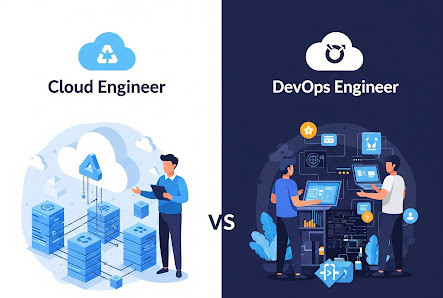views
At first glance, jobs like DevOps Engineer and Cloud Engineer appear to raise the same issues because they share the types of technologies used, but they have two distinct types of functions. "DevOps Engineer" has a focus on automating and standardizing the entire software development and deployment cycle, linking developers and IT operations with CI/CD pipelines, Docker, Jenkins, and many other types of tools! "Cloud Engineer" roles will not include these functions, as they typically focus on building the cloud infrastructure in terms of AWS, Azure, or Google Cloud services; Cloud Engineers will typically focus on building secure, scalable, and performant systems as part of the cloud infrastructure. DevOps and Cloud Engineers may use overlapping tools or collaborate between functions, but their main objectives are different: DevOps is to deliver software, while Cloud Engineering is about robust architecture, efficiency.

What is the difference between a DevOps Engineer and a Cloud Engineer?
While the difference between the roles of a DevOps Engineer and a Cloud Engineer is mainly in terms of focus and duties, the two jobs are often interrelated and rely on each other in modern IT teams. In general, a DevOps Engineer focuses on improving the speed, quality, and efficiency of developing and deploying software. DevOps Engineers create and manage automation pipelines, integrate testing and monitoring tools, and oversee the process of code moving from development to production. Ultimately, their goal in both development speed and quality is continuous integration and continuous delivery (CI/CD) and streamlining as many of the manual processes that exist when new products and features get launched. DevOps Engineers improve the speed and quality of the end product by building out automation processes and systems in development, but bring development and operations teams together by creating as much collaboration and formality as possible in CI/CD.
A Cloud Engineer builds, deploys, and maintains the organization's cloud infrastructure. Cloud Engineers are generally responsible for cloud applications in one of the major cloud providers, like AWS, Azure, or Google Cloud, while using a proper combination of security, scalability, and cost. Cloud Engineers are responsible for the overall architecture, storage, networking, and security configurations in the cloud. In their function, a Cloud Engineer mostly focuses on infrastructure instead of deployments to ensure development and operations teams have the platform and environments they need are reliable.
Though there is overlap—mostly in cloud-native environments, these roles take different perspectives on problems. A DevOps Engineer may automate deployments using cloud tools, while a Cloud Engineer will create and configure those tools and environments in the cloud. To summarize, DevOps is a process and automation, and Cloud Engineering is infrastructure and platform. Other than the definition, both are vital in operating efficient, modern IT operations.
1. Primary Focus
DevOps Engineer: Works on automating the software development life cycle, which involves everything from integrating, testing, deploying, and monitoring.
Cloud Engineer: Works to build and manage the cloud infrastructure that supports applications and services.
2. Core Responsibilities
DevOps Engineer: Sets up CI/CD pipelines, publishes deployments to environments, manages version control, and automates the manual work to improve collaboration between dev and ops.
Cloud Engineer: Develops cloud architectures, configures networking, manages cloud security, and ensures performance scalability of cloud resources.
3. Tools and Technologies
DevOps Engineer: Works with tools such as Jenkins, GitLab CI/CD, Docker, Kubernetes, Ansible, Prometheus, and additional monitoring tools.
Cloud Engineer: Uses cloud platforms and tools, such as AWS, Azure, GCP, Terraform, and CloudFormation. Works with virtual machines, storage, and databases.
4. Skillset
DevOps Engineer: Automation, scripting (Bash, Python), configuration management, and experience using version control or source control systems like Git.
Cloud Engineer: Cloud platform services, virtualization, cloud networking, and cloud development security best practices.
5. Goal
DevOps Engineer: Increase the speed, reliability, and collaboration between teams using automation.
Cloud Engineer: Ensure availability, scalability, and cost-efficiency of cloud-based infrastructure systems.
6. Stakeholders
DevOps Engineer: Works collaboratively with developers, teams, QA, and operations to automate code conceptualization, delivery, and operational maintenance.
Cloud Engineer: Collaborates with DevOps, IT, and security teams to provide and maintain a stable cloud foundation.
Watch now: Online Job Internship at Evision Technoserve
Conclusion
Both Cloud Engineers and DevOps Engineers serve key functions in the modern IT realm, but their roles vary in their scope and focus. Recognizing the differences between a cloud engineer and a DevOps engineer is crucial for businesses in developing a robust tech framework, and for individuals who want to develop careers in the quickly evolving cloud and DevOps space.
Source:






















Comments
0 comment